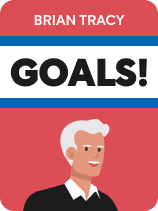

This article is an excerpt from the Shortform book guide to "Goals!" by Brian Tracy. Shortform has the world's best summaries and analyses of books you should be reading.
Like this article? Sign up for a free trial here .
Are you looking for Goals! quotes by Brian Tracy? What are some of the most noteworthy passages worth revisiting?
In Goals! How to Get Everything You Want—Faster Than You Ever Thought Possible, motivational speaker Brian Tracy shares the mindset and the steps that will help you reach your goals in the shortest amount of time. He believes that goal-setting requires changing your mindset, being clear about what you want, using visualization, and keeping track of your progress.
Here’s a selection of key passages—plus explanations to help you put them into context.
Goals! How to Get Everything You Want—Faster Than You Ever Thought Possible
Author Brian Tracy has traveled around the world to give thousands of seminars and talks about achieving goals—and he’s living proof that his principles work. His compelling rags-to-riches story shows just how much you can accomplish when you have a strategy for going after what you want. In Goals!, Tracy outlines the goal-setting method that worked for him, which consists of changing your mindset, being clear about what you want, using the power of visualization, and keeping track of your progress.
The following Goals! quotes highlight some of Brian Tracy’s key ideas.
“The very act of accepting responsibility short-circuits and cancels out any negative emotions you may be experiencing.”
Tracy writes that any change you want to make in your life is entirely up to you. Therefore, you must stop dwelling on your misfortunes and take responsibility for your life. Understand that you only have control over yourself, not the past or other people’s opinions.
“The greatest enemies of success and happiness are negative emotions, of all kinds.”
Tracy writes that any change you want to make in your life is entirely up to you. To get what you want, Tracy says that you first have to free yourself from negative thoughts, emotions, and behaviors, particularly:
- A sense of entitlement—you justify dwelling on negative emotions because you think you have a right to feel that way. For example, if you lost your job, you think you deserve to wallow in self-pity instead of taking action and looking for a new job.
- A victim mentality—you refuse to acknowledge the part you played in unfortunate situations and blame outside factors. For example, you blame your current situation on something your parents did when you were a child.
- Hypersensitivity—you put too much stock in others’ opinions or treatment of you. For example, you don’t volunteer to head a project because you’re worried that others might think you don’t have the skills for it.
“Goal setting is so powerful that the very act of thinking about your goals makes you happy, even before you have taken the first step toward achieving them.”
Even though circumstances are bound to change and not everything will go according to plan, the act of thinking about and planning your goals itself can better prepare you for the challenges that come your way.
Tracy writes that you shouldn’t aim to come up with a perfect plan from the beginning. Instead, just aim to get started on working toward your goals—you can make adjustments to your plan along the way. Even if you don’t consider yourself a planner, he says it’s a skill you can learn.

———End of Preview———
Like what you just read? Read the rest of the world's best book summary and analysis of Brian Tracy's "Goals!" at Shortform .
Here's what you'll find in our full Goals! summary :
- Brian Tracy's steps to setting and reaching your goals
- How to approach your goals with the right mentality
- Why persistence is more important than courage






